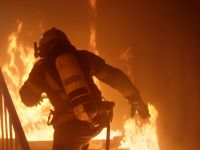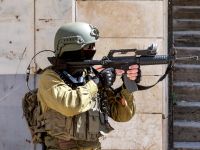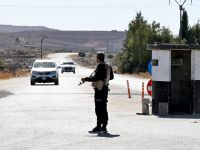Police fired tear gas and water cannons to disperse demonstrators headed toward the Israeli Embassy in Cairo as Arabs took to the streets for a fourth day in a row of anti-Israeli protests on Monday, keeping up the pressure on their governments to get tougher with Israel.
A group of artists and intellectuals had called for a march from Cairo University to the nearby Israeli Embassy, in a heavily guarded office building along the Nile. Hundreds who responded to the call started running toward the embassy, breaking through one line of riot police. Egyptian Police responded with tear gas and water cannons, confining protesters to a spot near the campus.
In the southern Egyptian town of Sohag, thousands of university students and teachers joined hands in burning Israeli flags and urging their leaders to "take serious steps against Israel”.
Meanwhile, at least four protests broke out across Jordan. At the University of Jordan, anti-riot police used batons to prevent around 500 demonstrators from leaving their campus. In Zarqa, 27 kilometers northeast of the capital city of Amman, some 3,000 people chanted "Death to Israel" and called for jihad, or holy war, against the Jewish state, according to AP.
Jordan's government on Sunday said it was considering unspecified measures in its relations with Israel. Egypt and Jordan, the only Arab countries to have signed peace treaties with Israel, have kept their ambassadors away from Tel Aviv for months, blaming Israel for the violence that broke out more than 18 months ago.
Arabs also took to the streets in Lebanon, Libya, Sudan and Yemen.
Libyan leader Moammar Gadhafi led a march in his capital, Tripoli, and called on Arab countries to open their borders to let Arab volunteers fighters in to help the Palestinians.
Some 20,000 Sudanese marched through their capital, Khartoum, carrying banners declaring: "No peace with the Zionists," "No bargaining when it comes to Jerusalem."
In Yemen, more than 200 journalists gathered in front of the U.S. Embassy in San`a carrying pictures of Yasser Arafat. They handed an embassy official a letter accusing the United States of bias toward Israel.
In the Ein el-Hilweh refugee camps on the outskirts of the southern Lebanese city of Sidon, hundreds of people demonstrated yelling, "We want to blow up embassies if [Palestinian leader Yasser] Arafat becomes a martyr. We want to hijack planes if Arafat becomes a martyr."
In Alexandria, Egypt, some 10,000 people gathered in support of the Palestinians.
In a related development, Palestinian Planning Minister Nabil Shaath on Sunday rejected U.S. criticism that Yasser Arafat can do more to stop Palestinian suicide attacks. "[Palestinian] President Arafat is a hostage. The Palestinian people in Ramallah are hostages of Israeli forces, and the American president speaks of Israel's right to defend itself ... This is very astonishing. We have not seen this before," Shaath said following talks with Egyptian Foreign Minister Ahmed Maher.
Lebanese President Emile Lahoud issued a statement Monday condemning what he called international silence over the suffering of the Palestinians. "Time has come for Israel to know that the policy of imposing security by force will not succeed in making the Palestinian people abandon their rights," Lahoud said.
Jordan's King Abdullah II on Sunday called on the United Nations to "provide protection to the Palestinian people."
In an interview in Monday's Al Hayat, Sheik Mohammed bin Rashid Al Maktoum, crown prince of Dubai and the UAE defense minister, accused the United States of letting the situation get out of hand. In addition, he criticized Palestinian suicide bomb attacks directed at civilians, but said: "How can the Palestinian leadership prevent this when Israel besieges it, destroys its security establishments and continues the policy of assassination? Violence breed violence."
In Iraq, President Saddam Hussein called upon Arab countries to adopt "economic measures" against Israel and its supporters. He did not elaborate, however the ruling Baath party in a statement called on the Arabs to use oil as a weapon against Israel, apparently by cutting off supplies to the West in order to force Western powers to pressure Israel.
“If oil is not used today as a weapon in the battle to enhance the honor and dignity of our [Arab] nation and our religion and to liberate our land and holy places against Zionism and America, it will be a curse”. (Albawaba.com)
© 2002 Al Bawaba (www.albawaba.com)







